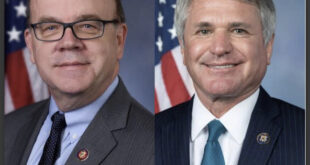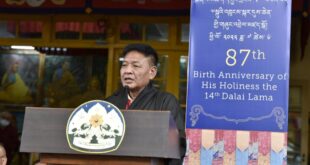The China Beat July 27, 2011
In early 2010, when President Obama met with the Dalai Lama, this made a considerable splash both in the news media and in diplomatic circles, and there have been various repercussions from Beijing’s side when other foreign leaders have met with the Tibetan figure. Obama’s July 16 meeting with the Dalai Lama in Washington, DC led to a furious reaction within hours from Beijing, perhaps even stronger than in the past. So we decided to ask Robbie Barnett, the Director of Columbia University’s Modern Tibetan Studies Program, the author of works such as Lhasa: Streets with Memories, and a long-time friend of this blog, what to make of this diplomatic dog that barked loudly—but so far hasn’t bitten. Here are the thoughts he passed on:

The tone of Beijing’s statements on its US relations seems to have flipped back to the positive within only 72 hours, if one believes that Beijing’s initial fury at the meeting with the Dalai Lama was genuinely felt. The evidence for this comes from Secretary of State Hillary Clinton’s meeting with Yang Jiechi in Bali on July 22, which seems to have gone off very smoothly. China’s Foreign Ministry spokesman Liu Weimin said after the talks: “The Chinese side raised its own concerns that it is important to respect the sovereignty and territorial integrity of China, and to respect China’s major concerns in the issues of Tibet and some other sensitive issues.” He added, “I sense that the US side understands the sensitivity of these issues and they both agreed to further promote dialogue and mutual understanding.”
This is astonishingly mild given the statement three days earlier from the same Ministry. That declared that the US had “grossly interfered in China’s internal affairs, hurt the feelings of Chinese people and damaged Sino-US relations.” The US Ambassador in Beijing had been called in and told that that the US must “immediately adopt measures to wipe out the baneful impact, stop interfering in China’s internal affairs and cease to connive and support anti-China separatist forces that seek ‘Tibet independence.’”
But all that Secretary Clinton had said to Yang in Bali, according to the Chinese side, was that the United States “understands the sensitivity of the Tibet and Taiwan issues” and “adheres to one-China policy and respects China’s sovereignty and territorial integrity”—very mild, boilerplate language. She did not even have to use the new terminology preferred by the Chinese side since President Obama’s 2009 visit to China, according to which the US recognizes China’s “core issues,” let alone say that those include Tibet and Taiwan.
This means that Beijing appears to have decide not to retaliate in any practical way for President Obama’s meeting with the Dalai Lama. For the moment, it looks like there will be no cost to the US side for the Dalai Lama meeting.
That would be very interesting, given the very heavy rhetoric used by Beijing and its summoning of the US Ambassador. China has been increasingly aggressive about any foreign leaders meeting the Dalai Lama, especially from 2007 onwards, and has had huge success in intimidating western European leaders into avoiding any meetings with him—a report by two German analysts even claimed last year that a country’s China trade drops for some two years after its leaders meet with the Dalai Lama. In the cases of France, Britain, and Denmark, the threat of retaliation was successfully used to get them to make diplomatic statements that rewarded China for that pressure, including embarrassing concessions, some of which were of historic proportions.
What might be the right inference to draw from this? I can think of several possibilities, some more constructive than others:
1. China might have decided that it needs to maintain good relations with the US because of the South China Seas issues and because the US is soon to make a decision on the sale of F16s to Taiwan. So it may just have decided unilaterally to drop the issue. If so, that would expose China to the risk that it will be seen as having made empty threats: it could be seen as having had its bluff called. That is not trivial in diplomacy: it was China’s success in calling President Clinton’s bluff over his human rights demands before renewing China’s MFN status in 1994 that strongly turned US-China relations to China’s advantage at that time. So it could make European and other leaders wonder if Chinese threats about such ritual events as meetings with the Dalai Lama have not always been largely empty bluster, or will be from now on.
2. The US could be seen as having skillfully handled the Chinese complaints in some way behind the scenes, without any significant concession, that persuaded Beijing not to pursue the issue. Perhaps, for example, they just reminded China about the F16s? If so, this would be interesting, because it would suggest a new and more confident, effective approach in western diplomacy towards China, one in which the megaphone is not used and does not need to be.
3. China might have interpreted the US reaction as an important diplomatic achievement for Beijing because it got the US President to agree to declare explicitly his opposition to Tibetan independence. The White House statement on the meeting with the Dalai Lama described the President as having said that “Tibet is a part of the People’s Republic of China and the United States does not support independence for Tibet.”* Such language has not appeared in previous White House statements after presidential meetings with the Dalai Lama.
So was this seen by China as a major diplomatic gift by the US side? It’s possible. But if it was, it might be expensive for China: the exact wording of the President’s acknowledgment of Chinese sovereignty appears to be new, but it is not of huge importance to Americans. In addition, the Americans pushed it into a subsidiary clause, where it would hardly be noticed other than by experts, and delivered it immediately, prior to any public pressure from Beijing. So it will not damage Obama’s reputation, and thus any cost to the Americans is relatively low.
But more importantly, the White House statement was issued hours before Beijing’s angry reaction. So if this was the reason for the sudden warming of relations, then Beijing’s claims about the deep hurt caused to the Chinese people by the meeting with the Dalai Lama and its demands for immediate recompense from the US would have been shown to be largely theatrical—its demands had already been met. And actually that’s what happened with the previous Obama meeting with the Dalai Lama, though the public never knew: Beijing made furious complaints in public afterwards, but actually its diplomats were satisfied because Obama, unlike George W. Bush, had held that meeting in private. But this time, the diplomatic process has been more visible. This could make other diplomats recalibrate their usual modes of response to China’s diplomatic threats of anger in the future.
*Note provided by RB: The first clause in the White House statement about China’s sovereignty over Tibet (“Tibet is a part of the People’s Republic of China”) is fairly standard for US officials to say, and has been said before by the President. But the second clause—”the US does not support independence for Tibet”—has been said by State Department officials only occasionally before, and I don’t know that it has ever been said by a President. The French and Danish Governments used the same two phrases in the controversial statements on Tibet they issued unilaterally in 2009, directly in response to Chinese requests (or more probably demands), in attempts to restore good relations after their leaders had met with the Dalai Lama.


